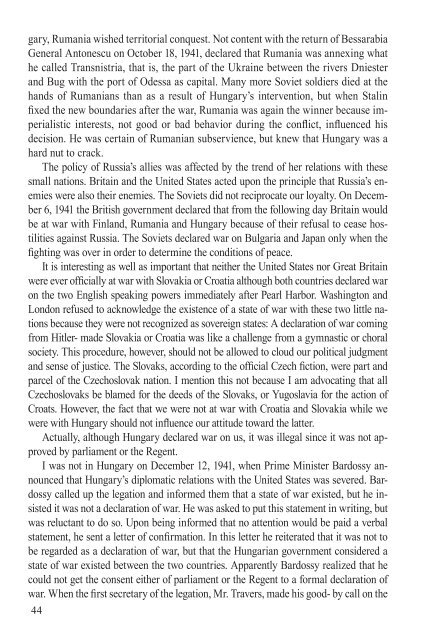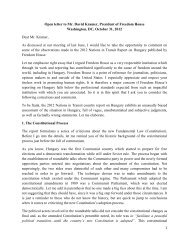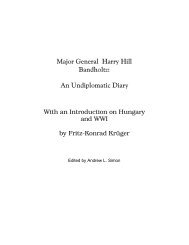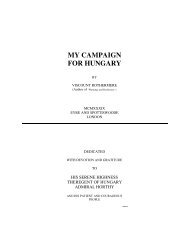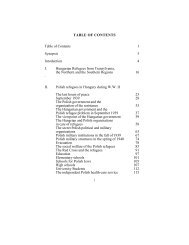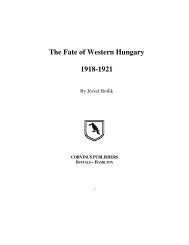Hungary and the Hungarians - Corvinus Library - Hungarian History
Hungary and the Hungarians - Corvinus Library - Hungarian History
Hungary and the Hungarians - Corvinus Library - Hungarian History
Create successful ePaper yourself
Turn your PDF publications into a flip-book with our unique Google optimized e-Paper software.
gary, Rumania wished territorial conquest. Not content with <strong>the</strong> return of Bessarabia<br />
general Antonescu on October 18, 1941, declared that Rumania was annexing what<br />
he called Transnistria, that is, <strong>the</strong> part of <strong>the</strong> Ukraine between <strong>the</strong> rivers dniester<br />
<strong>and</strong> Bug with <strong>the</strong> port of Odessa as capital. Many more Soviet soldiers died at <strong>the</strong><br />
h<strong>and</strong>s of Rumanians than as a result of <strong>Hungary</strong>’s intervention, but when Stalin<br />
fixed <strong>the</strong> new boundaries after <strong>the</strong> war, Rumania was again <strong>the</strong> winner because imperialistic<br />
interests, not good or bad behavior during <strong>the</strong> conflict, influenced his<br />
decision. He was certain of Rumanian subservience, but knew that <strong>Hungary</strong> was a<br />
hard nut to crack.<br />
The policy of Russia’s allies was affected by <strong>the</strong> trend of her relations with <strong>the</strong>se<br />
small nations. Britain <strong>and</strong> <strong>the</strong> United States acted upon <strong>the</strong> principle that Russia’s enemies<br />
were also <strong>the</strong>ir enemies. The Soviets did not reciprocate our loyalty. On december<br />
6, 1941 <strong>the</strong> British government declared that from <strong>the</strong> following day Britain would<br />
be at war with finl<strong>and</strong>, Rumania <strong>and</strong> <strong>Hungary</strong> because of <strong>the</strong>ir refusal to cease hostilities<br />
against Russia. The Soviets declared war on Bulgaria <strong>and</strong> Japan only when <strong>the</strong><br />
fighting was over in order to determine <strong>the</strong> conditions of peace.<br />
It is interesting as well as important that nei<strong>the</strong>r <strong>the</strong> United States nor great Britain<br />
were ever officially at war with Slovakia or Croatia although both countries declared war<br />
on <strong>the</strong> two English speaking powers immediately after Pearl Harbor. Washington <strong>and</strong><br />
London refused to acknowledge <strong>the</strong> existence of a state of war with <strong>the</strong>se two little nations<br />
because <strong>the</strong>y were not recognized as sovereign states: A declaration of war coming<br />
from Hitler- made Slovakia or Croatia was like a challenge from a gymnastic or choral<br />
society. This procedure, however, should not be allowed to cloud our political judgment<br />
<strong>and</strong> sense of justice. The Slovaks, according to <strong>the</strong> official Czech fiction, were part <strong>and</strong><br />
parcel of <strong>the</strong> Czechoslovak nation. I mention this not because I am advocating that all<br />
Czechoslovaks be blamed for <strong>the</strong> deeds of <strong>the</strong> Slovaks, or yugoslavia for <strong>the</strong> action of<br />
Croats. However, <strong>the</strong> fact that we were not at war with Croatia <strong>and</strong> Slovakia while we<br />
were with <strong>Hungary</strong> should not influence our attitude toward <strong>the</strong> latter.<br />
Actually, although <strong>Hungary</strong> declared war on us, it was illegal since it was not approved<br />
by parliament or <strong>the</strong> Regent.<br />
I was not in <strong>Hungary</strong> on december 12, 1941, when Prime Minister Bardossy announced<br />
that <strong>Hungary</strong>’s diplomatic relations with <strong>the</strong> United States was severed. Bardossy<br />
called up <strong>the</strong> legation <strong>and</strong> informed <strong>the</strong>m that a state of war existed, but he insisted<br />
it was not a declaration of war. He was asked to put this statement in writing, but<br />
was reluctant to do so. Upon being informed that no attention would be paid a verbal<br />
statement, he sent a letter of confirmation. In this letter he reiterated that it was not to<br />
be regarded as a declaration of war, but that <strong>the</strong> <strong>Hungarian</strong> government considered a<br />
state of war existed between <strong>the</strong> two countries. Apparently Bardossy realized that he<br />
could not get <strong>the</strong> consent ei<strong>the</strong>r of parliament or <strong>the</strong> Regent to a formal declaration of<br />
war. When <strong>the</strong> first secretary of <strong>the</strong> legation, Mr. Travers, made his good- by call on <strong>the</strong><br />
44


